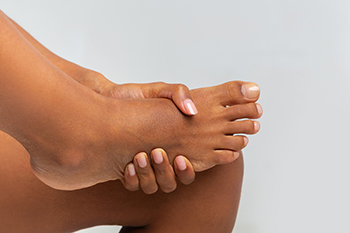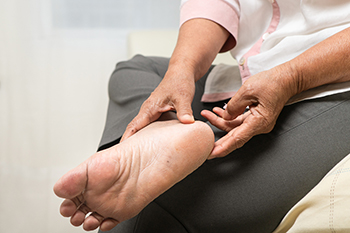Items filtered by date: October 2023
Painful Gout

Gout, often referred to as the disease of kings, is a form of inflammatory arthritis that has affected individuals from all walks of life. This condition, caused by the accumulation of uric acid crystals in the joints, typically manifests as excruciating pain, swelling, and redness, often in the big toe. The pain can be so intense that even the touch of a bedsheet can trigger agony. Gout occurs when the body produces excessive uric acid or struggles to eliminate it efficiently, leading to the formation of sharp crystals within the joints. While it primarily targets the feet, gout can also affect other joints, such as the ankles, knees, and wrists. Dietary choices, genetics, obesity, and other medical conditions can contribute to gout's onset. Understanding this ailment is essential for individuals who suffer from it and for those seeking to support them in their journey to manage gout effectively. Gout can affect daily activities, and if you are afflicted with this form of arthritis, it is strongly suggested that you are under the care of a podiatrist who can help you manage this condition.
Gout is a foot condition that requires certain treatment and care. If you are seeking treatment, contact one of our podiatrists from Advanced Foot & Ankle Care Centers. Our doctors will treat your foot and ankle needs.
What Is Gout?
Gout is a type of arthritis caused by a buildup of uric acid in the bloodstream. It often develops in the foot, especially the big toe area, although it can manifest in other parts of the body as well. Gout can make walking and standing very painful and is especially common in diabetics and the obese.
People typically get gout because of a poor diet. Genetic predisposition is also a factor. The children of parents who have had gout frequently have a chance of developing it themselves.
Gout can easily be identified by redness and inflammation of the big toe and the surrounding areas of the foot. Other symptoms include extreme fatigue, joint pain, and running high fevers. Sometimes corticosteroid drugs can be prescribed to treat gout, but the best way to combat this disease is to get more exercise and eat a better diet.
If you have any questions please feel free to contact our offices located in Nashville, Smyrna, Spring Hill, Columbia, Dickson, Fairview, Hohenwald, TN and the Middle Tennessee community . We offer the newest diagnostic and treatment technologies for all your foot and ankle needs.
Get Professional Care for a Broken Foot or Ankle
Erythromelalgia in the Feet

Erythromelalgia is a genetic condition characterized by recurrent bouts of pain, redness, and swelling, primarily in the hands and feet. These episodes are frequently triggered by elevated body temperature, which can result from activities like exercising or being in a warm environment. Consumption of alcohol or spicy foods can also provoke these painful episodes. Oddly enough, even wearing warm socks or tight shoes can induce debilitating foot pain, hindering daily activities like walking, wearing shoes, or functioning normally. The signs and symptoms of erythromelalgia in the feet typically emerge during childhood, although some mildly affected individuals may experience their initial episode later in life. As the condition progresses with age, the redness and discomfort may become chronic, extending from the feet to the entire legs. Erythromelalgia is often classified as a type of peripheral neuropathy, impacting the peripheral nervous system. This system links the brain and spinal cord to muscles and sensory receptors responsible for detecting sensations such as touch and pain. If you think you might have erythromelalgia or any type of foot pain, it is suggested that you make an appointment with a podiatrist for a proper diagnosis and treatment.
Foot Pain
Foot pain can be extremely painful and debilitating. If you have a foot pain, consult with one of our podiatrists from Advanced Foot & Ankle Care Centers. Our doctors will assess your condition and provide you with quality foot and ankle treatment.
Causes
Foot pain is a very broad condition that could be caused by one or more ailments. The most common include:
- Bunions
- Hammertoes
- Plantar Fasciitis
- Bone Spurs
- Corns
- Tarsal Tunnel Syndrome
- Ingrown Toenails
- Arthritis (such as Gout, Rheumatoid, and Osteoarthritis)
- Flat Feet
- Injury (from stress fractures, broken toe, foot, ankle, Achilles tendon ruptures, and sprains)
- And more
Diagnosis
To figure out the cause of foot pain, podiatrists utilize several different methods. This can range from simple visual inspections and sensation tests to X-rays and MRI scans. Prior medical history, family medical history, and any recent physical traumatic events will all be taken into consideration for a proper diagnosis.
Treatment
Treatment depends upon the cause of the foot pain. Whether it is resting, staying off the foot, or having surgery; podiatrists have a number of treatment options available for foot pain.
If you have any questions, please feel free to contact our offices located in Nashville, Smyrna, Spring Hill, Columbia, Dickson, Fairview, Hohenwald, TN and the Middle Tennessee community . We offer the newest diagnostic and treatment technologies for all your foot care needs.
Foot Care Tips for Elderly People

As you age, your feet undergo changes that require extra care and attention. To maintain healthy feet in your senior years, effective strategies can be implemented. Regularly inspecting your feet for cuts, sores, or signs of infection, and promptly addressing any issues helps to prevent complications. Keep your feet clean and dry to prevent fungal infections, especially between the toes. Moisturize your skin, and avoid applying lotion between the toes, as excessive moisture can lead to fungal growth. Trim your toenails carefully to prevent ingrown nails or infections. Choose footwear that is comfortable and supportive, with ample room for your toes and cushioned soles. Orthotic insoles can provide additional support and alleviate discomfort. Lastly, engage in gentle foot exercises to maintain flexibility and circulation, such as ankle rolls and toe stretches. By adopting these practices, you can ensure your senior feet remain comfortable and healthy for years to come. It is suggested that you contact a podiatrist if you are interested in learning about additional senior foot care tips.
Proper foot care is something many older adults forget to consider. If you have any concerns about your feet and ankles, contact one of our podiatrists from Advanced Foot & Ankle Care Centers. Our doctors can provide the care you need to keep you pain-free and on your feet.
The Elderly and Their Feet
As we age we start to notice many changes in our body, but the elder population may not notice them right away. Medical conditions may prevent the elderly to take notice of their foot health right away. Poor vision is a lead contributor to not taking action for the elderly.
Common Conditions
- Neuropathy – can reduce feeling in the feet and can hide many life-threatening medical conditions.
- Reduced flexibility – prevents the ability of proper toenail trimming, and foot cleaning. If left untreated, it may lead to further medical issues.
- Foot sores – amongst the older population can be serious before they are discovered. Some of the problematic conditions they may face are:
- Gouging toenails affecting nearby toe
- Shoes that don’t fit properly
- Pressure sores
- Loss of circulation in legs & feet
- Edema & swelling of feet and ankles
Susceptible Infections
Diabetes and poor circulation can cause general loss of sensitivity over the years, turning a simple cut into a serious issue.
If you have any questions please feel free to contact our offices located in Nashville, Smyrna, Spring Hill, Columbia, Dickson, Fairview, Hohenwald, TN and the Middle Tennessee community . We offer the newest diagnostic and treatment technologies for all your foot and ankle needs.
Causes and Symptoms of Bunions

A bunion is a common foot deformity that affects the joint at the base of the big toe. This condition occurs when the big toe deviates outward, causing the joint to protrude and creating a visible bump on the side of the foot. Bunions typically develop over time due to a variety of factors. Genetics plays a significant role, as the shape and structure of your foot can predispose you to bunions. Wearing ill-fitting shoes, especially those with narrow-toe boxes or high heels, can exacerbate the condition. Additionally, inflammatory joint conditions like arthritis may contribute to bunion formation. The symptoms of a bunion can range from mild to severe. Common signs include pain, swelling, redness, and tenderness around the affected joint. Over time, the big toe may angle towards the other toes, causing discomfort and difficulty finding well-fitting shoes. The skin over the bunion may become thickened and calloused. For some individuals, bunions can restrict their daily activities and lead to further foot problems if left untreated. If you have developed a bunion, it is strongly suggested that you consult a podiatrist who can offer you relief and treatment options that are right for you.
If you are suffering from bunions, contact one of our podiatrists of Advanced Foot & Ankle Care Centers. Our doctors can provide the care you need to keep you pain-free and on your feet.
What Is a Bunion?
A bunion is formed of swollen tissue or an enlargement of boney growth, usually located at the base joint of the toe that connects to the foot. The swelling occurs due to the bones in the big toe shifting inward, which impacts the other toes of the foot. This causes the area around the base of the big toe to become inflamed and painful.
Why Do Bunions Form?
Genetics – Susceptibility to bunions are often hereditary
Stress on the feet – Poorly fitted and uncomfortable footwear that places stress on feet, such as heels, can worsen existing bunions
How Are Bunions Diagnosed?
Doctors often perform two tests – blood tests and x-rays – when trying to diagnose bunions, especially in the early stages of development. Blood tests help determine if the foot pain is being caused by something else, such as arthritis, while x-rays provide a clear picture of your bone structure to your doctor.
How Are Bunions Treated?
- Refrain from wearing heels or similar shoes that cause discomfort
- Select wider shoes that can provide more comfort and reduce pain
- Anti-inflammatory and pain management drugs
- Orthotics or foot inserts
- Surgery
If you have any questions, please feel free to contact our offices located in Nashville, Smyrna, Spring Hill, Columbia, Dickson, Fairview, Hohenwald, TN and the Middle Tennessee community . We offer the newest diagnostic and treatment technologies for all your foot care needs.
Surgery for Diabetic Peripheral Neuropathy

Diabetic peripheral neuropathy, or DPN, is a common complication of diabetes. It occurs when high blood sugar levels damage the nerves, especially those in the legs and feet. DPN can lead to various symptoms, including numbness, tingling, burning sensations, and pain in the affected areas. It can also cause muscle weakness and affect balance and coordination. Over time, it can have serious complications if not managed properly. Surgery to release nerves in the legs has been shown to help people with this affliction and researchers have found that when people had such surgery, they experienced less pain and had an improved ability to feel touch. Surgery on a specific nerve in the tarsal tunnel area seemed to work best in these cases, and those who underwent such surgery were less likely to get ulcers or need amputation. If you suffer from DPN, it is strongly suggested that you make an appointment with a podiatrist for a full evaluation and treatment. Surgery may or may not be right for you, but new developments are constantly being made in this area that can potentially be helpful.
Foot surgery is sometimes necessary to treat a foot ailment. To learn more, contact one of our podiatrists of Advanced Foot & Ankle Care Centers. Our doctors will assist you with all of your foot and ankle needs.
When Is Surgery Necessary?
Foot and ankle surgery is generally reserved for cases in which less invasive, conservative procedures have failed to alleviate the problem. Some of the cases in which surgery may be necessary include:
- Removing foot deformities like bunions and bone spurs
- Severe arthritis that has caused bone issues
- Cosmetic reconstruction
What Types of Surgery Are There?
The type of surgery you receive will depend on the nature of the problem you have. Some of the possible surgeries include:
- Bunionectomy for painful bunions
- Surgical fusion for realignment of bones
- Neuropathy decompression surgery to treat nerve damage
Benefits of Surgery
Although surgery is usually a last resort, it can provide more complete pain relief compared to non-surgical methods and may allow you to finally resume full activity.
Surgical techniques have also become increasingly sophisticated. Techniques like endoscopic surgery allow for smaller incisions and faster recovery times.
If you have any questions please feel free to contact our offices located in Nashville, Smyrna, Spring Hill, Columbia, Dickson, Fairview, Hohenwald, TN and the Middle Tennessee community . We offer the newest diagnostic and treatment technologies for all your foot and ankle needs.


